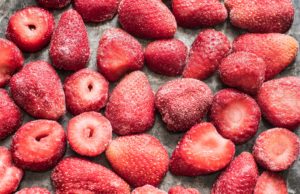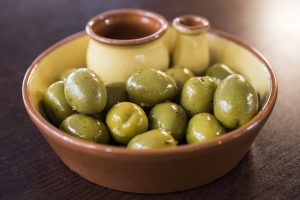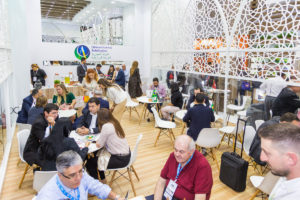São Paulo – The supermarket sector APAS Show will open next Monday (15) at Expo Center Norte in the city of São Paulo, with the largest space ever assembled for Arab companies. With 214 square meters and in three different pavilions, White, Blue, and Yellow, their participation is organized by the Arab Brazilian Chamber of Commerce (ABCC). A total of 27 companies will exhibit at the spaces.
The ABCC has been bringing Arabs to the sector’s biggest show in Latin America for almost a decade. In this edition, the companies will have an even more diversified profile, offering frozen and fresh fruits, vegetables, olives, vegetable oils, sweets, chocolates, tomatoes, dates, beverages, seeds, coffee, spices, cleaning supplies, and other goods.

“It is our biggest-ever participation in APAS, with three spaces and a diversified presence of countries from North Africa, the Gulf, and the Levant. We hope this show will allow a more significant market opening for Arab products, and they can be increasingly placed in Brazil, both straight to consumption or as ingredients,” said the secretary-general & CEO of the ABCC, Tamer Mansour (pictured above, with the entity’s Marketing & Content director Silvana Gomes and New Business director Guilherme Fedozzi).
Among the companies, 25 are originally from Arab countries, including Egypt, Jordan, the United Arab Emirates, Iraq, Tunisia, and Saudi Arabia, and two are from Brazil but have operations in the region. During the APAS Show period, the ABCC will also receive trade missions from Arab countries, bringing around one hundred businesspeople from the region in the event period under its initiatives.

In the entity’s assessment, the greater diversification of exhibitors at APAS indicates the Arabs are making progress in Brazilian retail and have reached the moment to seek space in the higher tiers of the sector; premium products, including segments disputed by competitive, traditional, and well-established brands for Brazilian consumers.
“It’s a new moment,” defined Gomes. “This year, the Arabs are coming to sustain the competitive position they already hold in the ethnic food segment, taking advantage of Brazilians’ familiarity with Syrian-Lebanese cuisine and a large number of Arab descendants in Brazil, but also to further explore opportunities in new categories,” said the director.

One of the factors to which Gomes attributes the greater interest of Arab companies in Brazil is the active prospection work carried out by the ABCC’s offices in Dubai and Cairo to show companies in the Gulf and North Africa opportunities in the Brazilian market based on research and activities by the organization.
According to the director, this effort resulted in the presence of companies from Iraq and Saudi Arabia in the show for the first time, in addition to a growing number of entities from other Arab nations, which already participate regularly in the APAS Show. Mansour also claimed marketing and social media promotion managed to show Arab exporters the importance of a show the size of APAS.
What are the companies, and what do they offer?
In the Blue Pavilion will be the Egyptian companies Oriental Fruits (frozen garlic, oranges, and strawberries), Frutella (orange and grapefruit), Haggan Group – Altamoura (dates), Dakahlia (olives, oils, dried grapes, and vegetables), GMS Trade (essences, citronella, and cedar oils), Frosty Trade, a Brazilian company managing logistics operations for Arab companies doing business with Brazil, and Great Food from Iraq.

In the White Pavilion will be Jordanians Giant Industrial Group – GiG (cleaning supplies), Nafeeseh Sweets (sweets), Mahmoud Walid Al-Jitan and Partners Company – Paradise Bakeries (Arab sweets), Aghati Sweets (sweets), Chocolate Lake Company – Chocolake (chocolates), Al Ameed Coffee – Ameed Food Industries Company (coffee), Adnan Khudari & Sons Trading Company (spices, seasonings, herbs, teas, sauces, and vegetables), Med Trading – Al Jazira, (olive oil) from Tunisia, and Skylight (olive oil, olives, dates, frozen strawberries, and canned tomatoes), from Egypt.
In the Yellow Pavilion will be the Tunisian companies Riviere d’Or (olive oil), Nouri Dates – Sapphire International Trading (dates), Ennour Dates (dates), Alta Olea (olive oil), Afrimex Trading (dates), and Asdrubal (olive oil), Emirati Samasin Investment Group (seeds) and Golden Export (dates), Saudi Al Jameel (beverages), and Jomara – Bateel (dates), and Brazilian Taybe (food and beverages) that imports its goods from Lebanon.
Arab foods in the Brazilian market
Although Brazil imports mainly petroleum products and fertilizers from the Arab countries, the region also supplies food to the Brazilian market. Last year, these shipments totaled USD 117.7 million and included products such as sardines, olives, and oranges, according to a survey by the ABCC.
“We are managing to progressively increase exports from the Arab countries to Brazil, equalizing our trade balance and diversifying products beyond oil and petrochemicals,” said Mansour. “Last year, Brazilian imports from Arab countries surpassed historical records, with a predominance of fertilizers and petrochemicals, but we understand the market is open to food and household products,” said the secretary-general.
*With information from the Arab Brazilian Chamber’s press office
Translated by Elúsio Brasileiro




